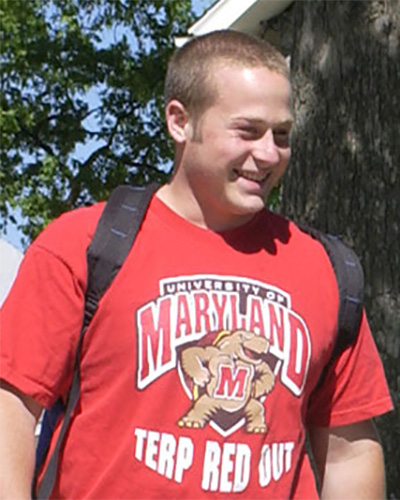April 11, 2016

Tragically, Paul and Vivian Schafer’s son, PJ, succumbed to sudden cardiac death while playing college lacrosse in 2003. To help cope with their grief, they wanted to educate others about the disease. So they organized an annual golf tournament to raise awareness and money for research to prevent it from affecting other young athletes and their families.
In 2013, the Schafers began donating a portion of the proceeds to the Children's Heart Program at the University of Maryland. Already, positive results have been realized. Through their funding, nearly a dozen young athletes and family members have been identified at risk for sudden death through a new screening protocol, and were provided early interventions and treatments.
The Schafers' story illustrates how having passion for a cause and an interest in philanthropy can not only advance future research, but how it can make a measurable and immediate impact in saving people’s lives.
‘No idea’ about the risks
Although sudden cardiac death in young athletes is rare—about one in 100,000 per year—most of the cases are the result of underlying and undiagnosed cardiac conditions. As a result, neither the athlete nor his or her parents is aware of the risk factors that cause sudden death—signs that can be diagnosed with careful testing—until it is too late.
“We had no idea that our son PJ had risk factors for sudden cardiac death,” said Vivian Schafer. “We had a known family history of heart disease, so we had been proactive to do routine lab work. But we had no idea about the genetic risks.”
This became the driving force behind the decision to launch the PJ Schafer Memorial Golf Tournament, which raises money for sudden cardiac death and premature heart disease research, education and community outreach services.
“Our goal is to help other people, other families, avoid having the same experience that we did,” said Vivian Schafer.
 A common goal
A common goal
As it turned out, their goal was perfectly aligned with that of Geoffrey L. Rosenthal, MD, PhD, professor of pediatrics and head of the Division of Pediatric Cardiology.
“We heard through a friend that the University of Maryland was planning to create a community outreach program for sudden cardiac death,” commented Paul Schafer. “Dr. Rosenthal’s plans matched our goal, and we knew that the effort would have an immediate impact. We wanted to help support it.”
“The Schafers had created a foundation to memorialize their son, PJ, and do something good for their community,” Dr. Rosenthal said. “Their goal was to raise money to benefit those at risk of sudden cardiac death. They wanted to optimally align their philanthropic objectives with what the money would be used for. So we engaged with the family to fund a clinic that is designed around reducing the risk of sudden death in athletes.”
Getting SAFER
Specifically, funding from the Schafers has enabled physicians at University of Maryland to develop a sports pre-participation cardiovascular risk screening protocol for student athletes. Called SAFER (Screening Athletes and Families for Exercise Related Risk), the program operates outreach clinics in the Greater Baltimore Area, offering comprehensive evaluation of young athletes to determine their risk of disease and providing treatment, counseling, and ongoing care to those who are identified at risk.
“The collaboration with the PJ Schafer Foundation has been extremely helpful, allowing us to dedicate time and resources to our outreach efforts,” says Sudhir Vashist, MBBS, MD, assistant professor of pediatrics, who is overseeing the education, screenings, and research related to this project.
“Outreach is extremely important to our program,” he added. “In the time since the clinic has been open, about one year, we have identified about 10 children, as well as a number of additional family members, at risk for sudden death. In other words, the downstream effect of SAFER is huge.”
To date, the PJ Schafer Cardiovascular Research Fund has contributed over $50,000 to this program. Dr. Rosenthal recognizes the importance of having donors like the Schafers to support his alma mater.
“Their involvement has been catalytic in helping to shape this program,” he said. “As clinicians, we can only do so much. So it’s critically important to have people like the Schafers to help us reach our goals.”
‘Very positive’ experience
Paul and Vivian Schafer say they are grateful for the support that the University of Maryland has shown for their cause.
“Our experience with Maryland has been a very positive one. It’s exactly what we had hoped it would be,” said Paul Schafer. “It is amazing to see how putting your money to work can make an immediate, positive impact.”
“It just shows that, if you have good people to support you, and you feel deeply passionate about something and want to make a difference, you can,” added Vivian Schafer. “I think we have made a difference. With the help of our family, friends and volunteers, I hope PJ’s memory lives on forever through our efforts.”
The 13th Annual PJ Schafer Memorial Golf Tournament will be held on June 23, 2016, at the Compass Pointe Golf Courses. For more information about the tournament, including how to make a donation, please visit www.pjschafer.com.
Contact
Department of Anesthesiology
(410) 328-6120 (phone)
(410) 328-5531 (fax)
swalsh@som.umaryland.edu
University of Maryland School of Medicine
Office of Development
31 South Greene Street, 3rd Floor
Baltimore, Maryland 21201
Phone: 410-706-8503
